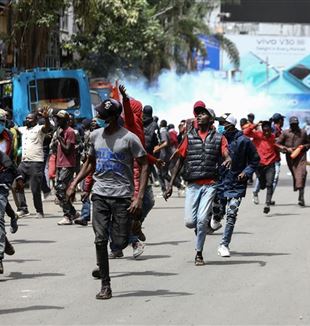
Kenya: The uprisings and the good we seek
The protests of young people, the desire for freedom and justice, and the work on the eighth chapter of The Religious Sense. Some friends from Nairobi speak of what sustains them as their country descends into chaos.Since June 18, Kenya has been rocked by large protests that spread across at least 40 of the country's 47 provinces, culminating in the deaths of around 20 protesters (but some local newspapers put the death toll at more than 50) and the arrests of dozens of civilians. Young people have taken to the streets against the financial budget of controversial President William Ruto, a measure that was promptly withdrawn and would have affected the weaker sections of the population. “We had never seen such a movement before, initially peaceful demonstrations, coordinated through social media and carried out by young people from all over Kenya,” says Antonino Masuri, director of the AVSI Foundation in Nairobi.
“But something went wrong and, perhaps due to infiltration or we are not sure how, they degenerated into clashes with the army. We ourselves have experienced moments of great tension in the streets near where we live and work. We are concerned for our team, our young volunteers and our people, but this situation is also very challenging. What do we really desire? What do we hold dear? I have no ready answers; I can only put these questions before God. That is why I go to Mass every morning, pray the Rosary for peace, and then go to work. I am certain that Jesus has won, otherwise nothing would withstand. We can be free even in the midst of all this chaos because God has given us a place, which is Africa, and a companionship of friends to share everything with. I am always struck by Fr. Giussani’s intelligence, who reminds us that true freedom is the experience of the truth of the self.”
Peter Matenghe, head of CL in the country, echoes him: “The riots caught us off guard because none of us imagined what was stirring in the hearts of our young people. I was impressed by the huge crowds that appeared on the streets. Their absolute determination, energy and coordination was fantastic. Suddenly, young people, especially the so-called GenZ, showed great interest in issues that were previously foreign to them. Even my teenage daughter, usually reserved though curious, suddenly became very outspoken, relaying social media messages that challenged the status quo. I was struck by this desire for freedom that she, like her peers, is crying out for.” They are calling for justice, because the country has been living in a very difficult situation for years. The government is struggling to keep its finances in order (international debt is so high), corruption is endemic, there is a lack of jobs and prospects, not to mention the natural disasters that have hit Kenya in recent years: the locust invasion that destroyed crops, to the floods and inundations that have forced thousands of people to evacuate and raised the alert for the spread of diseases such as cholera and malaria. Through it all, the inaction of the political class, which has done nothing but enrich itself at the expense of civilians, has exacerbated the climate of mistrust.
“Yet even the protesters are confused in their demands; there is no clear description of what they really want. After the initial demand for the budget to be withdrawn, to which the president agreed, they went on to demand his resignation and the dissolution of Parliament. Would good government action be enough to appease them? At present, nothing seems to indicate that it will happen soon. Many of them are angry, believing that their parents' generation has been brainwashed by the state and the church, and because of this is incapable of bringing about something new. I asked myself, is that really the case? Are we really like that?” Fortunately, says Peter, he has a place where he can bring these questions, and that is his School of Community.
Read also - Czech Republic: From memory a task
“With friends of the Fraternity we have tried to judge what our country is going through in the light of what we have encountered, and so we have thought about what Giussani recounted so many times about the events of 1968. Why is there a sudden challenge to the status quo, to authority, to the Church, to tradition? When did we abandon the fundamental principles? Fr. Giussani says, “When a Christian acts, they are already revolutionary in principles.” Have we been faithful to this principle? Reading his biography we have re-discovered that it is possible to face the upheavals of history with confidence and hope. In the work we are doing on chapter eight of The Religious Sense, Fr. Giussani reminds us how we risk losing freedom if we abandon the method, the path. Kenya is in chaos, it would not be difficult to lose our way and we do not have easy solutions at hand. However, the more I see the ongoing demonstrations, the more I want to delve deeper into the work of the School of Community.”